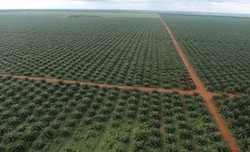EnviroNews | 21 August 2020
The Edo State Government of Nigeria has set out 100,000 hectares (ha) of land for oil palm cultivation by investors.
Governor Godwin Obaseki made the disclosure in a keynote address delivered on Tuesday, August 18, 2020 at a webinar focused on “Investing in the Oil Palm Value Chain in Edo State”.
Edo earmarks 100,000ha of land for oil palm cultivation
The Edo State Government of Nigeria has set out 100,000 hectares (ha) of land for oil palm cultivation by investors.
Governor Godwin Obaseki made the disclosure in a keynote address delivered on Tuesday, August 18, 2020 at a webinar focused on “Investing in the Oil Palm Value Chain in Edo State”.
The webinar was hosted by Wandieville Media in partnership with Edo State Investment Promotion Office (ESIPO).
While assuring potential investors of the sustainability of the Edo State Oil Palm Programme, Gov. Obaseki said: “This is a commitment of the Edo State Government to restore Edo to the prime of being the Oil Palm hub for the country…we have a large number of estate farms and we are using that as an opportunity to expand the availability of land for Oil Palm”.
While disclosing that 100,000 hectares of land has been set out for oil palm cultivation, he noted: “We are in the process of allocating the first launch to designated investors and preparations have been going on in the last couple of years.”
Mr. Kelvin Uwaibi Head, ESIPO, stated that the market is open to both domestic and foreign investments and the processing segment is an avenue for productive investments as smallholder farmers desire to have milling structures to improve the value of their products and get better prices for their commodities as the price system is market-driven.
Panelists at the session were Mr. Richard Edebiri, Commissioner of Agriculture, Edo State; Mrs. Njideka Nwabuko, Head Oilpalm Commodity Working Group at Central Bank of Nigeria (CBN); Mr. Billy Gbansah, Agricultural Coordinator, Okomu Oil Palm Plc.; Mr. Felix Nwabuko, Managing Director, Presco Plc.; Mrs. Wilma Aguele, Managing Director, Wilhabi Investment Ltd; Mr. Chuka Mordi, Managing Director, Ellah Lakes Plc.; Mr. Temitope Fatunmbi, Programme Officer Landscape/Oil Palm Programme of IDH-the Sustainable Trade Initiative; Dr. Celestine Ikuenobe, Executive Director, Nigeria Institute for Oil Palm Research (NIFOR); and Wandie Kazeem, Chief Executive Officer, Wandieville Media, who moderated the discussion.
They discussed the operations around the Edo State Oil Palm Value chain, the opportunities available to potential investors, challenges, and benefits therein. According to them, the sustainability of the sector is dependent on the degree to which smallholder farmers are included in the operations as they make up a larger percentage of the primary sector in the value chain.
The two major players in the Edo State Oil Palm industry – Presco and Okomu – have reportedly shown commitment to support the empowerment of smallholder farmers in the Edo Oil Palm value chain with Presco reaching an agreement with the CBN to implement the Smallholder Farmer Agro Scheme geared towards the provision of extension services to smallholder farmers to enlighten them on the benefits of adopting mechanised farming with improved seed varieties. Okomu, it was disclosed, has established a new milling structure in the state to support smallholder farmers in improving the quality of their produce.
Despite previous challenges, such as manpower emigration and reluctance of indigenes to harness the agricultural sector, the Edo State Oil Palm industry is filled with myriads of opportunities for investment in different segments of the value chain, said participants. They listed the value chain to include players in seed distribution, extension service provision, logistics, packaging, processing and pharmaceuticals.
Mrs. Wilma Aguele, MD, Wilbahi Investment Ltd, commented on the opportunities available in the Edo State Oil Palm industry and how it can be a source of multigenerational wealth as long as proper infrastructural facilities such as electricity and good road system are put in place.
She emphasised the need to ensure the inclusion of women and youths as regards the provision of credit facilities and funds for investments, saying: “Within the next 100 years, oil palm and its derivative will be number one in the food, commercial, industrial and pharmaceutical sectors.”
Mr. Billy Ghansah, Agricultural Coordinator, Okomu Oil Plc., explained that oil palm farming is very demanding but rewarding and its success is hinged on the adoption of improved seeds and implementation of Good Agronomic Practices (GAP). He stated that the company has improved its processing capacity by 50 percent and built a new oil mill structure to harness the opportunities in the sector.
To ensure that investors are fully supported, IDH has setup a co-investment programme to assist investors by covering 30 percent of investment cost with a focus on sustainable production, forest/natural resource protection and inclusion of smallholders in the middle of its implementation process.
Mr. Chuka Mordi, Managing Director, Ellah Lakes Plc. commented on the potential of the sector from the international perspective.
He said: “It’s a globally priced sector …the income is denominating the US dollars or linked to the US dollars. It makes sense to engage in a business in which one can have significant margins and can be scaled up significantly”.
This, he added, has shown that the sector has the potential to make Nigeria one of the major players in the international market.
Delegates concluded that, with proper implementation and partnership of stakeholders, the Edo State Oil Palm sector will be a major contributor to the sustainable development of the state and Nigeria in the next couple of years.













